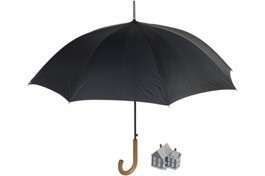 RISMEDIA, November 30, 2010—You’ve done the hard work: your seller has successfully sold their home due to your efforts, and the ink is dry on the closing papers. While ushering a successful sale is undoubtedly your primary job as a REALTOR®, it’s important to build a relationship with your client to ensure you might work with them again in the future—or get a referral.
RISMEDIA, November 30, 2010—You’ve done the hard work: your seller has successfully sold their home due to your efforts, and the ink is dry on the closing papers. While ushering a successful sale is undoubtedly your primary job as a REALTOR®, it’s important to build a relationship with your client to ensure you might work with them again in the future—or get a referral.
One way to do this is to give your client some advice on choosing homeowners’ insurance once they settle into their new place. It’s a daunting task that your client might ask you about—if they do, or even if they don’t, here are some basic tips to impart to your client to make choosing homeowners’ insurance an easier task:
1. Get past the advertising fluff. When selling your home and buying a new one, your mailbox becomes a sieve of solicitations—and one of the front-line offenders are homeowners’ insurance companies. Our quick scan of the latest bunch of mailings reveals quite a few boasting fancy packaging and idealistic images of beautiful homes with magazine-ready design schemes. They’re often printed on pricey paper stock and feature florid writing poetically telling you how they can help you protect your home and all the prized possessions it contains, better than any other company can. As a REALTOR®, stress the fact that just because a company has the advertising budget for big mailings, doesn’t necessarily mean it’s the best. It’s quite possible that the homeowner might do just fine with a company that sends them a mailing—but they might do even better with another company that never sends solicitation mailings. The boil-down is this: don’t just go with the first thing you see, even if it seems good.
2. Consult your state’s resources. Choosing from a huge array of large national insurance companies can be daunting; that’s why it’s a good idea to start in your state. Your state will likely have an insurance, consumer advocacy or chamber of commerce website offering homeowner’s insurance tips (just an example, find one for New York State at http://www.ins.state.ny.us/hmonindx.htm). The benefit to a state site is that it gives you a good idea as to what your insurance covers given your particular state’s weather conditions and home wear and zoning issues. These sites also give information on important state codes; it’s critical to check that the company you’re researching understands these codes extremely well. Finally, many state sites list consumer complaints against particular companies from residents in your state.
3. Make sure the coverage is not only extensive, but appropriate for you. A homeowner may come across a potential company with a good service record and reputation, but that doesn’t mean its ideal for them. Look at the details of what the company focuses on. If a company looks great overall, but they emphasize flooding and water damage in all their marketing materials, it’s not going to be right for you if you live in Arizona—no matter how great a company it is. Make sure the company’s strong points match the needs of your particular home and geographical area.
4. Familiarize yourself with the claim process. The insurance company might advertise the fact that you can make frequent claims for repairs, but many companies hike up your premium if you frequently file small claims. This isn’t necessarily unethical, as it’s often stated in the fine print, but it could definitely hurt your wallet; that’s why it’s smart to ask up front how both routine/small and catastrophic claims might affect premiums. At the most, asking will ultimately save you money, i.e., you can do a small repair yourself instead of filing a claim for it, and ultimately the money you spend on the repair might be less than the premium hike.
5. Know the condition of your home. It’s impossible to effectively choose homeowners’ insurance unless you know the condition of your home inside and out. For instance, if you have a roof that’s prone to leakiness and not in the best shape, you’ll obviously want to avoid a policy that doesn’t cover this sort of thing. The best way to learn about issues in your home is to get a home inspection of your new home by a certified, reputable home inspector. The home inspector will examine your new home for any potential faults and issues to watch for; this is incredibly powerful ammunition in choosing the right homeowners’ insurance, and can save a lot of money in the event anything goes wrong and you find yourself in the claim-filing process.
Dan Steward is president of Pillar To Post Professional Home Inspections.
For more information, visit www.pillartopost.com.










